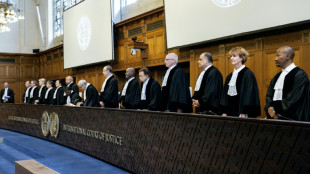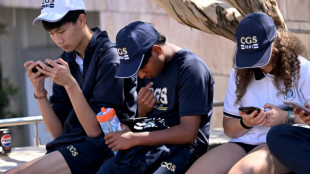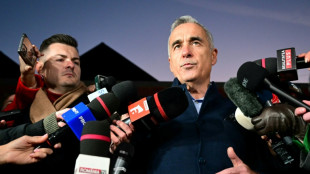
-
 Crypto boss eats banana art he bought for $6.2 million
Crypto boss eats banana art he bought for $6.2 million
-
Teen news boss criticises Australian social media ban

-
 Taiwan detects 41 Chinese military aircraft, ships ahead of Lai US stopover
Taiwan detects 41 Chinese military aircraft, ships ahead of Lai US stopover
-
Spain urged to 'build differently' after deadly floods

-
 WTO chief faces heavy task as Trump threat looms
WTO chief faces heavy task as Trump threat looms
-
Herbert takes control at Australian Open as Smith tanks

-
 Israel PM again warns Iran after top diplomat talks of revising nuclear doctrine
Israel PM again warns Iran after top diplomat talks of revising nuclear doctrine
-
Brilliant Brook's 132 puts England on top against sloppy New Zealand

-
 Brilliant Brook's 132 puts England on top against New Zealand
Brilliant Brook's 132 puts England on top against New Zealand
-
US landmine offer to Ukraine throws global treaty into 'crisis': campaign group

-
 Singapore hangs 4th person in three weeks
Singapore hangs 4th person in three weeks
-
Five things to know about NewJeans' shock split from agency

-
 Waste pickers battle for recognition at plastic treaty talks
Waste pickers battle for recognition at plastic treaty talks
-
Ireland votes in closely fought general election

-
 Top UN court to open unprecedented climate hearings
Top UN court to open unprecedented climate hearings
-
European countries that allow assisted dying

-
 British MPs to debate contentious assisted dying law
British MPs to debate contentious assisted dying law
-
Schmidt not expecting hero's welcome on Ireland return

-
 PSG stuck between domestic dominance and Champions League woes
PSG stuck between domestic dominance and Champions League woes
-
'Hot fight' as unbeaten Bayern visit Dortmund fortress

-
 Bordeaux-Begles' Samu 'not finished yet' with Wallabies
Bordeaux-Begles' Samu 'not finished yet' with Wallabies
-
Brook and Pope half-centuries haul England to 174-4 against NZ

-
 Yen rallies on rate hike bets as equity markets swing
Yen rallies on rate hike bets as equity markets swing
-
Ukraine superstar Mahuchikh brings 'good vibes' to her war-torn country

-
 PlayStation at 30: How Sony's grey box conquered gaming
PlayStation at 30: How Sony's grey box conquered gaming
-
Saudi Arabia hosts UN talks on drought, desertification

-
 PlayStation: Fun facts to know as Sony's console turns 30
PlayStation: Fun facts to know as Sony's console turns 30
-
Nepal's first transgender candidates run for local office

-
 Father of PlayStation says 'everyone told us we would fail'
Father of PlayStation says 'everyone told us we would fail'
-
Ireland seek to overcome former coach Schmidt's Wallabies

-
 Detroit survive Bears comeback to make it 10 wins in a row
Detroit survive Bears comeback to make it 10 wins in a row
-
Mexican actor Silvia Pinal dead at 93

-
 'Black Friday' deals target inflation-weary US consumers
'Black Friday' deals target inflation-weary US consumers
-
Liverpool look to deepen Man City crisis, Amorim seeks first Premier League win

-
 Police fire rubber bullets, tear gas at Georgia protesters after PM delays EU bid
Police fire rubber bullets, tear gas at Georgia protesters after PM delays EU bid
-
England lose three quick wickets in reply to New Zealand's 348

-
 Social media companies slam Australia's under-16 ban
Social media companies slam Australia's under-16 ban
-
Police fire tear gas at Georgia protesters after PM delays EU bid

-
 Canada watchdog sues Google over 'anti-competitive' ad tech
Canada watchdog sues Google over 'anti-competitive' ad tech
-
Hojlund gives Amorim winning Old Trafford bow, Roma hold Spurs

-
 Amorim wins first Man Utd home game after rollercoaster ride
Amorim wins first Man Utd home game after rollercoaster ride
-
France arrests 26 as South Asian migrant trafficking ring smashed

-
 At least 15 dead, 113 missing, in Uganda landslides
At least 15 dead, 113 missing, in Uganda landslides
-
Netanyahu threatens 'intensive war' if Hezbollah breaches fragile truce

-
 Bilbao join Lazio at Europa League summit, Chelsea cruise in Conference League
Bilbao join Lazio at Europa League summit, Chelsea cruise in Conference League
-
In Lebanon's Tyre returning residents find no water, little power

-
 Protests in Georgia after PM delays EU bid to 2028
Protests in Georgia after PM delays EU bid to 2028
-
Biden slams Trump tariff threats as 'counterproductive'

-
 TikTok tactics shake up politics in Romania
TikTok tactics shake up politics in Romania
-
'He should do comedy' says Norris of Verstappen comments


Spectre of royal meddling haunts Charles in Australia
The cloud from a decades-old political crisis hangs over King Charles III's tour of Australia, where the 1975 sacking of a sitting prime minister continues to fuel suspicions of royal meddling.
Governor-General John Kerr used his vice-regal powers in 1975 to topple Labor Prime Minister Gough Whitlam, a popular leader beset by a string of parliamentary scandals.
It remains the only time the governor-general -- the throne's envoy in overseas realms -- has made such a drastic intervention in Australian democracy.
Almost 50 years later, intrigue still swirls around the monarchy's role in "The Dismissal".
Recently unearthed correspondence exposed then-Prince Charles's stance on the interference -- a source of further controversy in a decades-long simmering debate on the relevance of the monarchy.
"It was an unprecedented action by Queen Elizabeth's representative in Australia," historian Jenny Hocking told AFP.
"It's a stunning, volcanic moment in our history. And the potential role of the monarch has always been a question."
Hocking fought a years-long legal battle to publish a trove of secret letters between Kerr and Buckingham Palace.
Finally unsealed in 2020 after a High Court ruling, the so-called "Palace Letters" showed Kerr dutifully keeping the queen's aides abreast of the unfolding political turmoil.
The letters suggest Queen Elizabeth II had no hidden role in sacking the prime minister.
- 'Extraordinary interference' -
But one recently surfaced exchange shows then-Prince Charles was at least supportive of Kerr's decision in hindsight.
"Please don't lose heart," Charles wrote to Kerr in the aftermath.
"What you did last year was right and the courageous thing to do."
Hocking said this amounted to "an extraordinary interference in Australian politics".
"Charles is basically praising him for dismissing an elected government, saying he'd made a courageous decision.
"And we should keep that in mind as we entertain the current king, who has been described before as a meddling prince."
News of the government's removal sent Australian stock markets into meltdown, sparking mass rallies and fears of civil violence.
For many Australians, it shattered their sense of independence and fuelled fears of colonial masters pulling the strings.
It remains seared into the psyche of the nation, where it is still taught in schools, and debated over the airwaves and over drinks at the pub.
- 'Eruptive' moment -
"It's because it was such an eruptive moment in our history," said Hocking.
Australian Prime Minister Anthony Albanese -- an avowed republican -- has said the imbroglio showed "the need for us to have an Australian head of state".
Swept to power in 1972 -- the first Labor government in more than 20 years -- Whitlam lost control of parliament as a string of forced resignations whittled away his majority.
Unable to secure enough votes to pass the government budget, governor-general Kerr sacked Whitlam and installed conservative opposition leader Malcolm Fraser in his place.
It remains "the most dramatic and controversial event in Australia's constitutional and political history", according to government historians.
Ironically, Whitlam and Fraser would bury the hatchet in the late 1990s to campaign together in favour of an Australian republic.
That 1999 referendum failed as 54 percent of Australians backed the status quo.
A recent poll showed about a third of Australians would like to ditch the monarchy, a third would keep it and a third are ambivalent.
J.Bergmann--BTB
